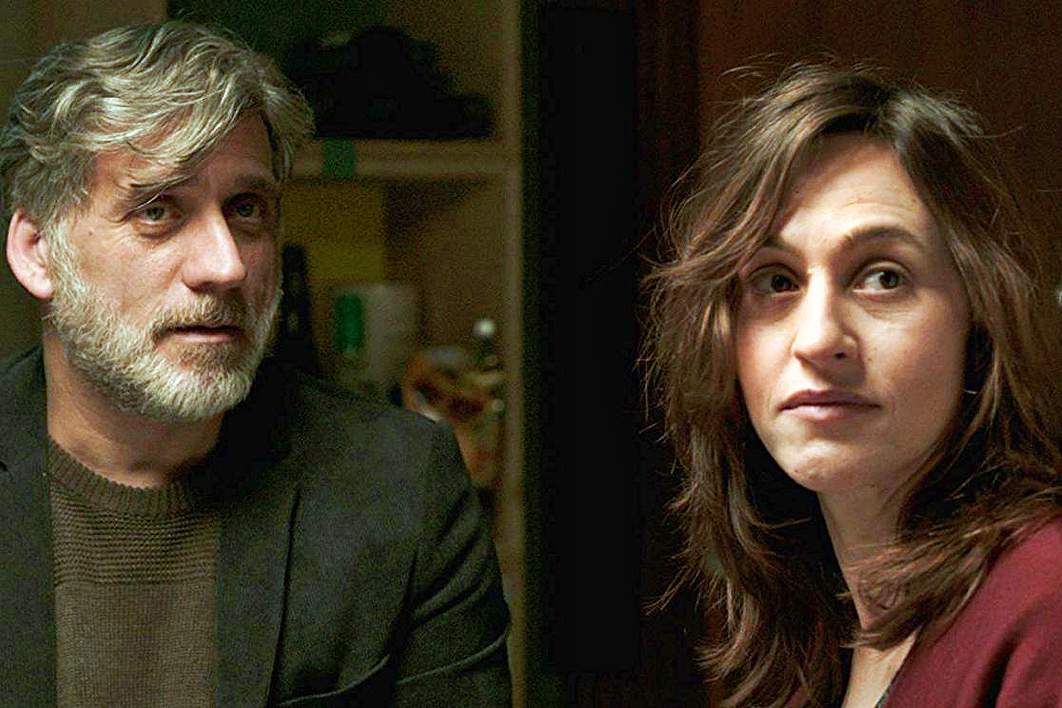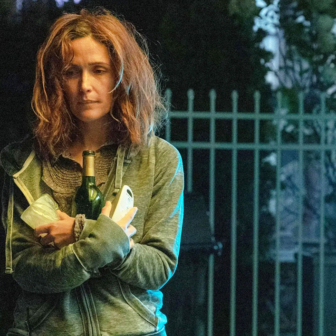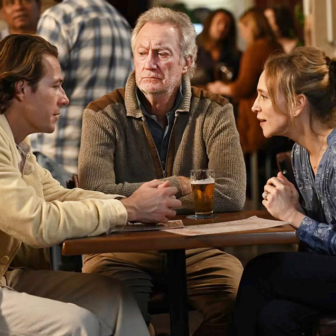Even if you avoid war films — after all, there’s enough carnage nightly on television — you may wish to see Samuel Maoz’s Foxtrot, which releases this week. It is a war film in which, beyond one brief, panicked burst of gunfire, there are no explosions and there is no fighting. It is not a “buddy movie,” as in Oliver Stone’s Platoon and a thousand war films since. You can forget about that whole genre.
It is a film that captures, briefly, hilariously, both the boredom and the absurdity of the foot soldier’s experience. That puts it in an honourable tradition, dating back to The Good Soldier Schweik, Mash and Catch-22. Above all, it is a critique of Israel as a militarised state, and the psychological damage it inflicts on its citizens.
It begins (much like Steven Spielberg’s Saving Private Ryan) with uniformed men marching up to a civilian doorway, where a woman faints dead away at the news they bear. Dafna Feldmann (Sarah Adler) is swiftly sedated by an army medic while her husband Michael (Lior Ashkenazi) struggles to get answers from the obdurate, smoothly efficient army team. How was their son Jonathan killed? Where was he killed? Why can’t he, the father, see the body? The army will take care of it all, he’s assured, right down to every last detail of the funeral.
This first part of the film is tense with the father’s anxiety, distress and fury. He can’t bear the hands that keep reaching out to him. “Don’t touch me,” he screams. Finally, he acts: no defender of the state, he picks up the phone to a friend who can call in a political favour. One way or another, Jonathan will be brought home.
Maoz’s imagery in this first act is cold, precise, clinically sharp. Michael, an architect, is hard-edged and walled in, and the visuals reflect this fact.
The second act takes us to an isolated outpost where five young conscripts, bored witless, watch an occasional lone camel approaching along the road. At night they slog their way back to their bunks in a metal container, one end of which is slowly sinking in the mud. At first the mood is sunny, and in one stunning sequence, which you might have seen in a trailer, Jonathan entertains himself and his buddies with a wonderful parody of a foxtrot, danced to some easy-listening dance music they coax out of a military radio.
The third act is about the reality of mourning, as the wife and husband, a year later, mark the birthday of their son. We still don’t know what really happened, and Maoz doesn’t show us until the final frame. But it is clear by midway that the Israeli Defence Force has been involved in a cover-up.
That’s what caused the Israeli defence minister, a member of the ultra-right Likud, to denounce the film, claiming Israel has the most “moral army” in the world. The denunciation didn’t seem to hurt the film, which swept Israel’s cinema awards.
Samuel Maoz came to film-making late. His first film, Lebanon, drew on his experiences in a tank crew during the Israeli invasion of Lebanon in 1982. He was unable to make that film until 2009, and it followed hot on the heels of Ari Folman’s 2008 Waltz with Bashir, a documentary in which animation was used to depict the traumatic memories of Israeli conscripts sent by their government into what became a massacre of Palestinian refugees.
Like Folman before him, Maoz uses animation to create a story at the psychological heart of his new film. Jonathan relates to his messmates a tale his father once told him: a coming-of-age story that’s both simple and silly, and was evidently, for his grandmother, profoundly shocking. The Philip Roth of Portnoy’s Complaint would have loved it.
Foxtrot is a surprising film: well paced, it unfolds confidently with its cards up its sleeve, clear and studied in its image-making. Both Ashkenazi and Adler give finely honed performances.
I don’t love it as much as I loved Waltz with Bashir, which was hugely brave, and desperate in its sadness. There is something rather more calculated about the directorial choices Maoz makes. Someone should tell him that in order to ratchet up the tension, and make the lead actor less likeable, there’s no need to have him kick a dog. Shoving the animal away would have done.
I was troubled at first by the hermetic atmosphere of the film. Palestinians are absent. The only signs of a possible enemy are faces glimpsed through rain-streaked car windows at identity checks. But Maoz is saying something quite important about the denial at the heart of a militarised state. It’s a denial in which Holocaust survival is invoked to trump every other form of suffering. It squeezes out all pity, deforming its children.
Sarah expresses this point of view quite early. “It’s all right,” she insists. “Don’t make a fuss. It’s someone else who has died.”
Michael stands for a generation that rebelled, and was made to feel guilty for it. Jonathan, with his wonderful, crazy rap version of the foxtrot, is of a new generation looking for ways to bear witness.
The Sydney Film Festival, just concluded, screened Hirokazu Kore-eda’s film Shoplifters about a week after it won the Palme d’Or at Cannes. It popped up in Rome about the same time so I was able to see it there. It has the same sadness, empathy and acute observation as the very first Kore-eda film I saw, Nobody Knows. That film was about a family of small children left locked in their apartment by their mother, who has warned them they mustn’t make a noise because they’re not supposed to be there. When she fails to return, their battle for survival makes for enthralling drama.
In a sense, Kore-eda is reprising that theme in Shoplifters. (In Japanese it’s Manbiki Kazoku, literally Shoplifting Family.) It too is about a Japanese family of somewhat unorthodox origins. The grandmother, her son and his partner have children they “found” and are teaching them to care for each other, pool resources and survive by, among other things, shoplifting. All the performances, including the children’s, are beautiful, but it was Sakura Ando as Nobuyo, the family’s “mother,” who stole my heart.
What a powerful observer of humanity Kore-eda is. Among other things, he has immense respect for children, their intelligence and the moral choices they make. And he raises important questions about the viability of families whittled down to the barest nucleus. I’m told cheers broke out in the press room at Cannes when Kore-eda’s Palme d’Or was announced. Catch it if you can. •




